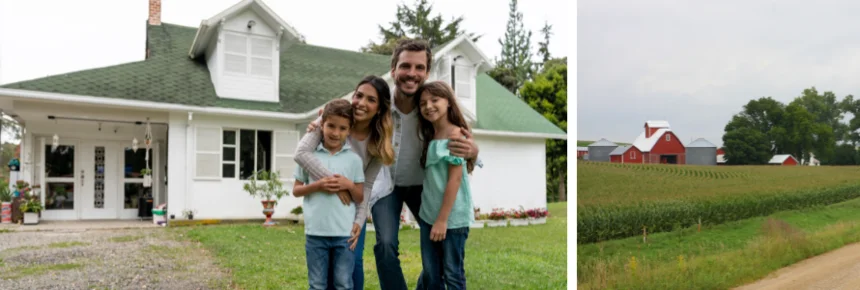If you file for bankruptcy, Iowa's very generous homestead exemption protects the entire value of your home, with some acreage limits.
If you're considering filing for bankruptcy in Iowa, the Iowa homestead exemption will help you protect the equity in your home. This article explains how much Iowa's homestead exemption is and how to apply it in your bankruptcy case when you want to keep your house.
How Much Is the Homestead Exemption in an Iowa Bankruptcy?
In Iowa, you'll use Iowa's state exemptions because the federal bankruptcy exemptions aren't available (some states allow residents to choose between the two sets). You'll find Iowa's homestead exemption amount listed below.
|
Iowa Homestead Exemption |
|
|
Homestead exemption amount |
Unlimited. |
|
Can spouses who file a joint bankruptcy double the exemption? |
Not applicable. |
|
Homestead exemption law |
|
|
Other information |
Property located in a city or town is limited to one-half acre; forty acres elsewhere. |
|
Where to find other exemptions. |
What Property Can You Protect With the Iowa Homestead Exemption?
Under the Iowa exemption system, homeowners can exempt unlimited home equity. The homestead exemption applies to real property, including a home or apartment if you use the property as your home to protect it under the homestead exemption.
Property can't exceed one-half acre if located within a city or town or forty acres if located elsewhere. If more than one dwelling house is located on the property, you can only protect one home, but you can select which house you want to protect. You can protect one or more adjoining lots of land as long as they are used as part of the same homestead.
Here are some other rules that apply to the Iowa homestead exemption:
The homestead exemption protects security deposits held by your landlord or utility companies (gas, water, electric, telephone) and any interest accrued if the deposit is held in an interest-bearing account. You can also protect any advance rent paid to your landlord under an unexpired lease. Also, if you purchased your homestead with money from a pension, it is protected.
Other Requirements for Keeping a Home in Bankruptcy
If you can't protect all of your home equity, you might not be able to keep your home, although the risk is fairly minimal in Iowa. Typically, the Chapter 7 trustee appointed to your case would sell the house, return the exemption amount to you, pay off the mortgage, and pay creditors with the amount remaining after deducting the trustee's fee.
In Chapter 13, the trustee doesn't sell property, so you could keep it. However, that doesn't mean Chapter 13 filers get a break regarding how much equity they can retain. Instead, you'd need to pay creditors the value of the nonexempt equity through the Chapter 13 plan.
But that isn't all. Keeping your home requires being current on the mortgage when filing for Chapter 7. Otherwise, you could lose it to the lender through foreclosure, possibly even during the Chapter 7 case. If you're behind on payments when filing for Chapter 13, you have an option not available in Chapter 7. You can catch up on the payments over time through the plan.
Learn about other requirements you must meet in Your Home in Chapter 7 and Your Home in Chapter 13. Also, find out why filing for Chapter 13 is better than Chapter 7 when you're behind on payments and don't want to lose your house.
Claiming the Homestead Exemption
When completing your bankruptcy forms, you'll do the following:
- disclose your home on Schedule A/B: Property
- list your home and the homestead exemption law on Schedule C: The Property You Claim as Exempt, and
- if filing for Chapter 7, explain whether you plan to keep or surrender the home on Statement of Intention for Individuals Filing Under Chapter 7.
Because your home is likely your most valuable asset, consider consulting with a bankruptcy lawyer to ensure you can protect it in bankruptcy.
Where to Find the Homestead Exemption Statute
Iowa's homestead exemption is in the Iowa Code at § 561 on the Iowa Legislature website (Iowa Code § 499A.18 defines apartments as homesteads). Still, the best way to protect your assets is by consulting a local bankruptcy lawyer.
When You Can Use Bankruptcy Exemptions
You can file for bankruptcy in Iowa after living there for over 180 days. However, you must live in Iowa for at least 730 days before filing to use the current state's exemptions. Otherwise, you'd use the previous state's exemptions.
If you lived in multiple states during the two years before filing for bankruptcy, you'd use the exemptions of the state you lived in for the majority of the 180 days before the two years immediately preceding your filing. (11 U.S.C. § 522(b)(3)(A).)
Also, you must own your home in the exemption state for at least 40 months before bankruptcy to avoid the homestead exemption being capped by federal law at $214,000 (amount adjusts on April 1, 2028). Homestead exemption use is also precluded when a filer engages in certain felonious or fraudulent acts. (11 USC §§ 522(p), (q).)
Learn more about filing for bankruptcy after moving to a new state and timing your bankruptcy case. Also, spouses can double some exemption amounts if both parties own the property, but not all of them. Learn about other filing considerations for spouses.
Need More Bankruptcy Help?
Did you know Nolo has made the law accessible for over fifty years? It's true, and we wholeheartedly encourage research and learning. You can find many more helpful bankruptcy articles on Nolo's bankruptcy homepage. Information needed to complete the official downloadable bankruptcy forms is on the Department of Justice U.S. Trustee Program website.
However, online articles and resources can't address all bankruptcy issues and aren't written with the facts of your particular case in mind. The best way to protect your assets in bankruptcy is by hiring a local bankruptcy lawyer.


